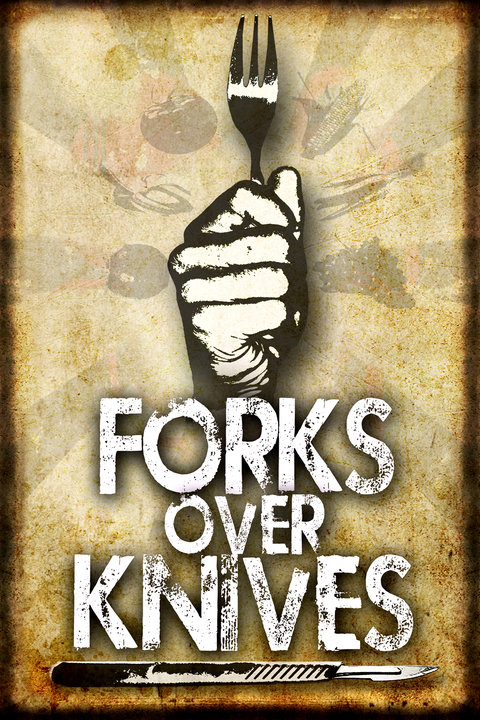There is no question, that the 2012 documentary, The Perfect Human Diet, wants you to think that it's the antithesis to the 2011 documentary Forks Over Knives. The Perfect Human Diet even plays off of the Forks Over Knives movie poster, except the fork has pierced a slice of steak.


Additionally, the movies would seem opposed, one exulting the benefits of a vegetarian or vegan lifestyle and the other promoting meat as essential to the human diet. However, after viewing both movies, I feel that they have one big similarity that probably hits harder at the obesity epidemic, than whether an individual decides to consume meat.
I think both films are loaded and bias. This doesn't mean that they don't have wise pieces of advice, but that the message loses a bit of power when the message is so slanted to one side. Forks Over Knives is slickly produced and relies more on individual testimonials, while The Perfect Human Diet, is very dry and academic, heavy with human evolution History and interviews with nutritionists.Both movies went back and forth over the meat issue. However, both also brought up the need for the elimination of processed foods. This is what struck a chord with me. Neither film had me convinced on the meat issue, but processed foods are clearly bad and we all know it, this is the discussion that we need to be having.
The Perfect Human Diet explored the processed foods idea the most, explaining how weight gain really started when we transitioned from Hunter/Gatherers to an agrarian society. Our primary food source started to become heavily dependant on products like wheat and corn, stuff that makes up a lot of our processed foods. We began to eat more and more sugar. Processed food consumption is at an time high and is especially frightening when you look at Childhood obesity numbers.
One of the dietitians interviewed for The Perfect Human Diet, brought up a great point. He mentioned how nutrition is up there with religion, politics and money as a hot button topic and something to avoid discussing at parties. He went on to mention that nutrition is like a belief system. I totally agree with his statement, as nutrition is so personal.
It seems like people fall into two camps.
The first, are people who follow a specific diet, could be anything- vegan, Atkins, juicing - but it's something that they firmly believe works for them. They may or may not be right, but their ideology is unchangeable, until they decide for themselves that they want to change it, unusually because something else might work better. This can even account for people with terrible diets, like my mom. She was firm in her Mid-west, meat and potatoes upbringing. She had a stubborn, "If it was good enough for my parents..." attitude. It was immutable.
The second type of people, are those who make terrible nutrition decisions and know it. They don't want to talk nutrition, because they don't want to be lectured or reminded of their own bad choices. They don't deny it, but they also don't want to talk about it and they especially don't want to talk about it to people with a firm nutrition ideology.
I really enjoyed chef Jaime Oliver's Food Revolution reality show and was quite shocked that people didn't embrace his advice, especially when it concerned school lunches. In fact, people (including parents) thwarted his efforts to improve school food. He didn't seem to be trying to do anything radical, it was mainly a focus on more fruits/veggies and less processed food, less sugar and fried crap. People did not want to hear it. It goes back to nutrition being a taboo subject. People don't like to be told that they are making terrible health choices and they certainly don't want to be told that they are extending those choices to their children. It's a health and parenting criticism, double taboo!
Personally, I think that we need to find ways to work around nutrition being a taboo subject. You cannot fix a problem that people won't talk about.